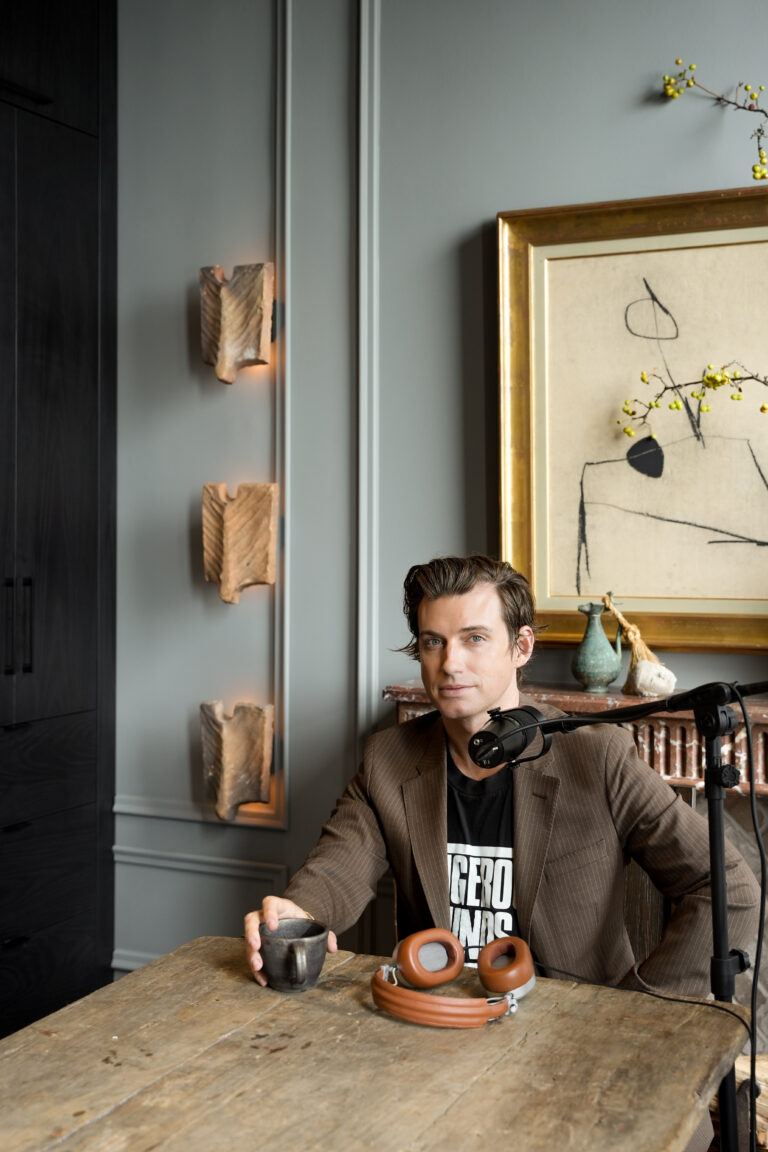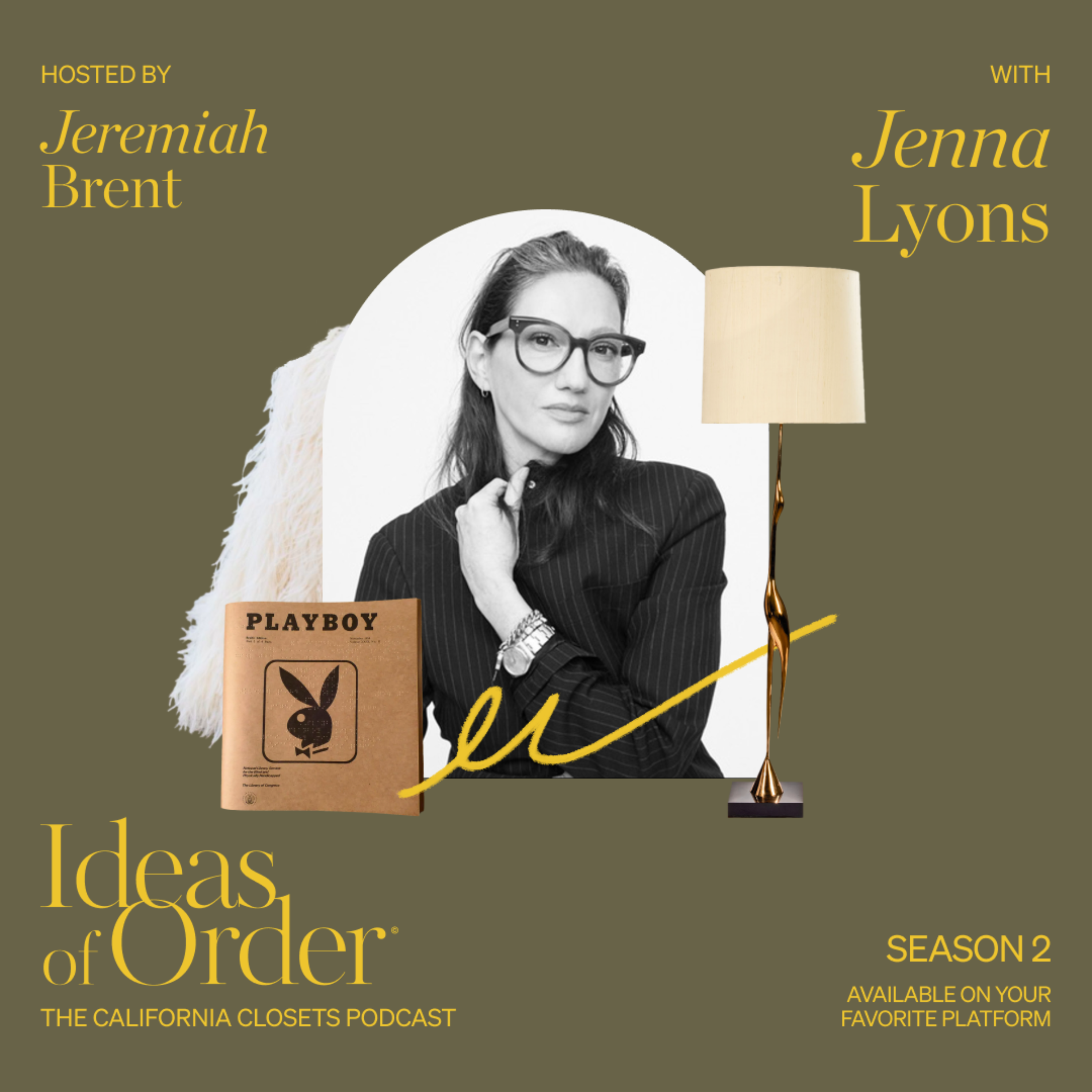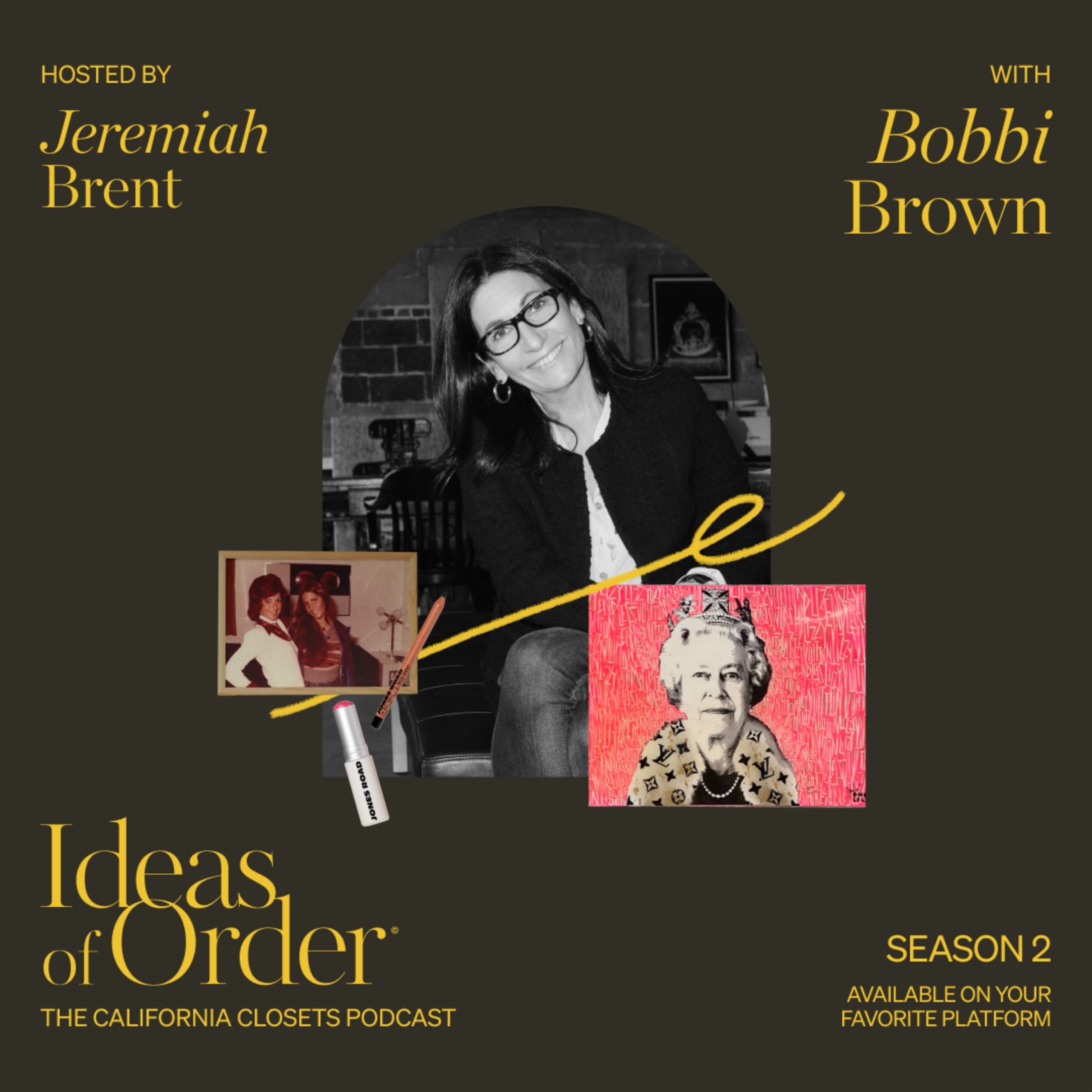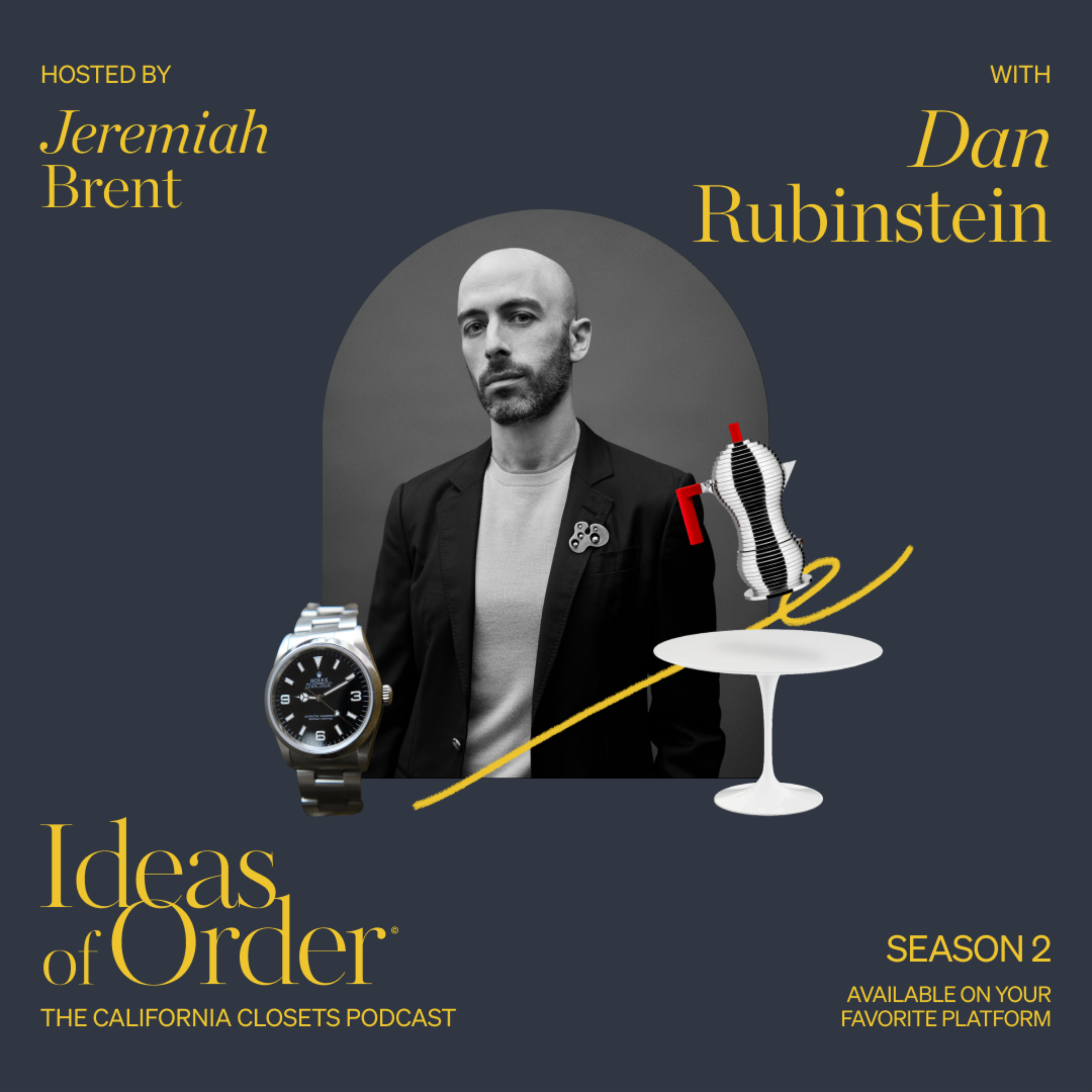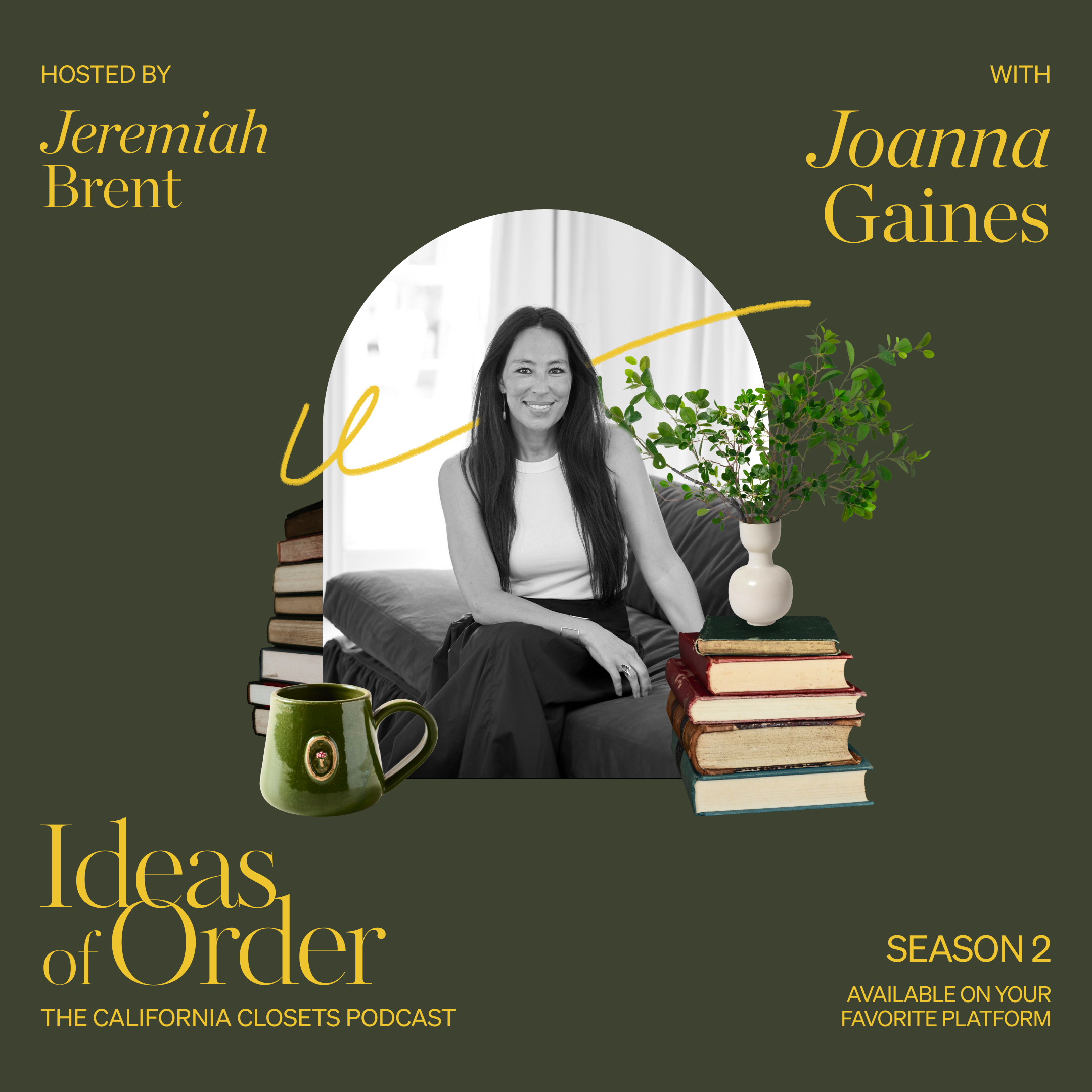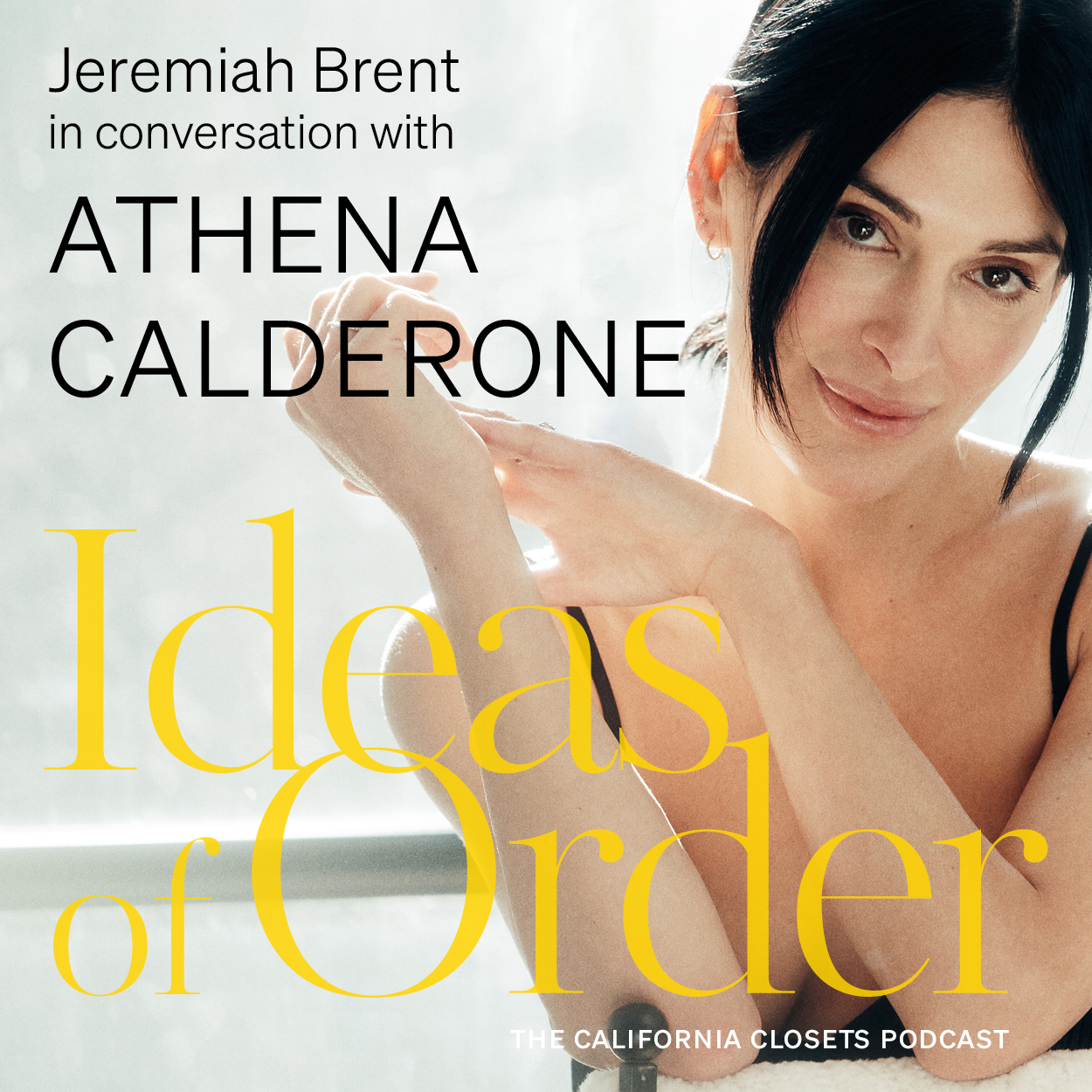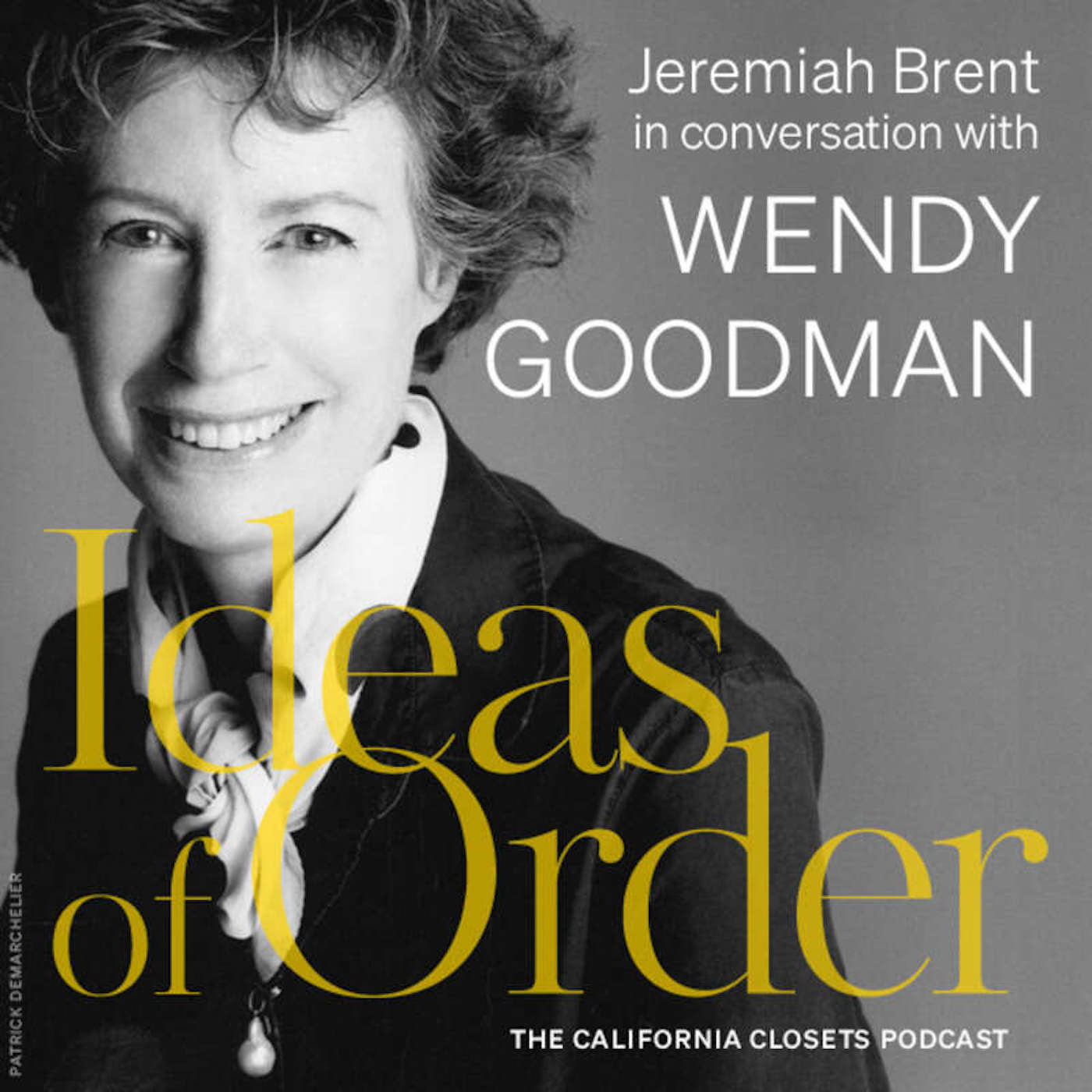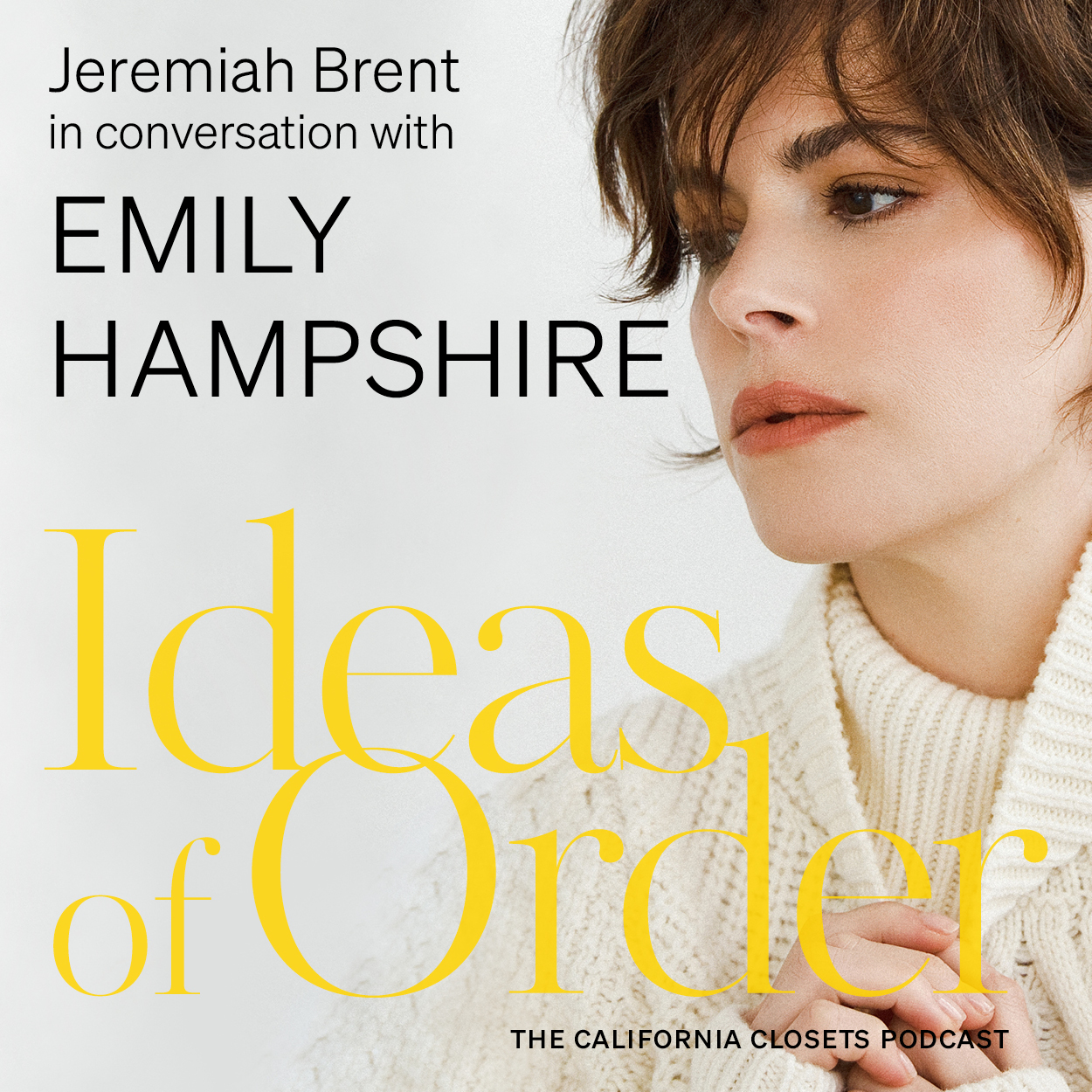This transcript was generated by an automated service. In some cases it may be incomplete or inaccurate due to inaudible passages or transcription errors.
Gwen: [00:00:00] This house was perfect for our family. Your goal in life is to give your children everything you can, but the best thing is love.
Jeremiah: Welcome to Ideas of Order, a podcast dedicated to answering the question, what does home mean to you? I’m Jeremiah Brent, and today we are coming to you from New York City with two very important guests. They’re extremely dear to my heart, the person who has actually taught me in so many ways, the art of home and the person that I’ve always dreamt of crafting a home for my entire life.
My mom Gwen and my daughter Poppy. We’re going to reminisce on my childhood home. We’re gonna learn more about a really big opportunity and a move that my mother recently made and how our ideas of home are solidified at a young age.
So for those of you listening, my mother had a very interesting childhood. She was a military brat that moved around. So I was wondering, mom, what was home? Uh,
Gwen: family because I was never in one place long enough to know what a real home was. I knew, never knew childhood friends and all of that were, it binds you to a place
Jeremiah: when you guys were traveling around and you bounce from home to home, were there things that you guys took with you or do you just, when you moved, you kind of had what was at that house?
Gwen: No. No. We took everything with us because, you know, we didn’t know what we were getting
Jeremiah: into. Right. How many times do you.
Gwen: At least, I wanna say at least 15 times. Wow.
Jeremiah: Before high school. Mm-Hmm. Was there ever a spot or a house in your childhood that really stood out to you? Yeah.
Gwen: I think Florida, we lived in Tampa.
It was just a little kind of a ranch style home. Mm-Hmm. I [00:02:00] loved the nature of it. I was one of those children who liked to catch snakes.
Jeremiah: Yes, I did not inherit that.
Gwen: Yes, I had no problem with that. My mother had a problem with it,
Jeremiah: however, and used to bring them home, right? Oh, yes, yes,
Gwen: yes. And then she’d say, Gwenie, I think that one’s poisonous.
Jeremiah: I want you to know something. If Poppy ever brought home a snake, I think my husband would pass out, really would actually pass out. Nature should be viewed through class. It’s something. So what did that house look like and feel like inside? In Florida it wasn’t
Gwen: anything fancy, right? You know, it was just a three-bedroom home, but I think it was because of the way our family felt there.
Why? For one my age? Yeah. I was nine or 10 a time when you’re. Becoming very aware of things. Yeah. Right. It was a
Jeremiah: lot of love. It was a loving chapter. Yes, yes, yes. Because it was a complicated journey. Yes. Your parents were complicated. Yes. As a lot of people’s parents can be. Sure. They did the best they could.
Exactly. When you look like, look back at your childhood and you know, even after you left because you moved out fairly early Right day after I graduated high school. Yeah. Is there ever a space that really. Held you that you look back and you’re like, wow, that one space really made an impact on me or affected me.
Gwen: Probably the house in the country. As long as I was with my family, I felt safe and secure and that was home. You know, it wasn’t until I was an adult that I realized people have lifelong friends. Yeah. I made friends that were temporary. Right. ’cause I wasn’t gonna be there.
Jeremiah: And homes that were temporary.
Yes. So your introduction into home was transactional? Yes. I. I
Gwen: wanted you guys to have roots.
Jeremiah: You know, when I look back and I, I’m always interested kind of at that question of like how, if there was a space that really held somebody or made an impact on them. And I put myself through that gut exercise once, and it was Grandma Arlene’s kitchen table in Merced [00:04:00] and her atrium there.
There was such a, she was such a dichotomy as a mother. She had her issues. Yeah. But as a grandmother. She was really nurturing to me. Mm-Hmm. Everything she did was rooted in creation or nurturing. Mm-Hmm. And she wasn’t somebody who was good at doing either of those. No. Doing, doing, doing that well to people.
And so I always, I remember sitting in that space and thinking, is this who she wants people to see her as? You
Gwen: felt it. Even if she wasn’t good at expressing it. Yeah,
Jeremiah: you felt it. Right? So you leave home, what happens next? I
Gwen: became a
Jeremiah: cop. So one of the first cops, female police officers in
Gwen: California? Yes.
No, the first females in that particular county.
Jeremiah: Yeah. Yeah. And that was when you could only wear a skirt, right? Oh god.
Gwen: And my nylons caught on fire. When I was directing traffic. You had to wear
Jeremiah: fucking nylons.
Gwen: No nylons, a skirt. And we had flares. And the wind was blowing and all of a sudden, so you, my nylons kept growing up, up, up, up, up.
And I was like, oh my God, those are very, very, very,
Jeremiah: didn’t you refuse to do it? And we were like, I’m
Gwen: putting up pants. I put a pants. Yes. Yeah. I said, gimme my pants.
Jeremiah: I think that sums you up pretty well. Yeah. Mm. Pretty much. What was the first home you ever bought? Little
Gwen: house. I was 20 years old. I bought a little house from an estate sale in, uh, Modesto.
It was two bedroom one. Little den built on, you know, it was probably a, a porch that somebody made into a den, had a little stove, you know, wood stove inside. I had the best time and it had a chandelier. Every place I’ve lived, there’s been some sort of chandelier.
Jeremiah: After bouncing around your entire life and not having a real relationship with home in general, why would it be important to you to buy something
Gwen: roots?
Nobody can make me move. There’s a pride in ownership of course, but it’s also you feel secure and you did it [00:06:00] yourself. Yeah. You gave yourself the security you need. You weren’t relying on somebody else to do it for you. Mm-Hmm. There’s, you know, pride, the integrity, all of it.
Jeremiah: Why’d, you leave that house,
Gwen: I?
had gotten pregnant with you. Surprise. So I went to a little apartment that had a pink stove, which for some reason I
Jeremiah: adored. Is there something that you’ve always looked for in a house because you’ve owned a lot of homes? Light. Light. I
Gwen: can tell you immediately, light is everything. It’s something that makes you feel connected.
Jeremiah: It’s funny. I think I feel like a cat sometimes. I like to bask in the sun. Yeah, me too. So, you know, we have different childhoods. Obviously you’re coming from a childhood with design that’s just transactional and purely, we’re here, we gotta be here. But how did you start crafting spaces for yourself? You
Gwen: realize that there are things that make you feel at home.
Mm-hmm. I gravitated initially towards antiques because there was so much history in them. It made me feel very comfortable and comforted.
Jeremiah: I like antiques too. Um, I’m married. That’s why you
Gwen: like me.
Jeremiah: I married a really cute antique. Yes, he’s adorable. Yes. He doesn’t know he’s an antique, which is probably part of his lure.
Um, I wanna skip forward a little bit because the first home I remember growing up in was a little yellow house on Sunset Drive. Mm-Hmm. And we had a huge backyard. Sunrise, sunrise. Um, and we had a huge backyard and we had ducks that were mean, but I love them. Hated the dog. Um, and I remember it again, being full of light.
Small but perfect. And it’s important noting too, ’cause my mother will never say it, but she’s always given and gone above and beyond for everybody in our family. She’s always worked three plus jobs my entire childhood. I.
We had a [00:08:00] really amazing home and a really bad neighborhood. All of a sudden it became bad. Yes. Which things happen, and I’ll never forget how hard you worked to get us a house in the best neighborhood, right on the fringe. Yes. Which you got us into the best neighborhood that I could afford, which in turn it was the best schools and the best new opportunity.
Well, you’re
Gwen: right. It started with fear. Yeah. You weren’t sleeping in your room because the gangs were fighting. Yeah. And there was gunfire and everything else, and it wasn’t like that when we moved in. So we found this house. It needed work. Every house does, but it had the light, the big windows. You know, I like a good galley kitchen.
Mm-Hmm. This house was perfect for our family. Your goal in life is to give your children. Everything you can, but the best thing is love witnessing their life, being there for every event.
Jeremiah: I’ll never forget when.
Rich. I was like, mom is really it. This is gonna, so I have my own room, parquet floors, I, who am I now? What is my, um. I’ve always been connected to the sense of pride that you have with home. Everybody was always responsible for their participation in home. Mm-Hmm. And responsible for taking care of it.
Sunday mornings were chores. You know, I was vacuuming those steps and you were doing what you were responsible for and contributing. I remember when I. You had the opportunity to get a decorator for the first time. Ooh. Oh my God. Do you remember the reveal? Like when we walked in and the house just completely done?
Yes. How did that feel? It
Gwen: was amazing. It’s one of the things, you just stand there and go, oh. This is gorgeous. How do you, how did she do this? Yeah. You know? And you learn from it actually. Yeah. Except for that one item that looked like an urn.
Jeremiah: Oh yeah. I think you kept it though. I [00:10:00] did. You still have it? I did.
Why do have a creepy? You are so, no, I remember being like, what ant is in there? What’s happening?
Gwen: We had people actually think it wasn’t perfect.
Jeremiah: Yeah. And it’s not like it’s fancy either. You just liked it. I just like. When you look back at memories of that house, was there one in particular that stands out to
Gwen: you?
It’s never a thing, it’s a feeling. Joy, laughter. That’s what makes
Jeremiah: home home. One of the first memories I have of actually my childhood, and it’s ironic because you know I’m doing this podcast with California Closets, but when you had them come in and do your dressing room, and I remember sitting back and watching the sense of pride and and ownership you had and the fact that you were creating something that was personalized to you.
Do you remember that? Does it stick out to you as your
Gwen: kids were growing up? There was always things you wanna do. To the homes you live in. Mm-Hmm. But sometimes it’s not possible right at that time in our lives. I got a designer. I wanted a closet like that. Mm-Hmm. I crave organization and so I’ve seen closets that were out of this world.
It was something I really wanted to do. Yeah. And it was yours for me. Yes. Yeah, exactly. Can we not be twins? Oh,
Jeremiah: was there anything, when you look at our house growing up that you remember bringing in? That you had in your own home? Oh,
you
Gwen: know, you bring your childhood with you. You have to recover from it most of the time, but you do definitely bring it with you.
Yeah. I think it was discipline. We wanted you kids to grow up with good heads on your shoulders, but we were also very loving, but we brought all that with us and never a thing that mattered. Not like a cookie jar that your mother makes.
Jeremiah: You did so much that I think made such an impact on me, really.
Uh-Huh? There was music playing on the weekends. Always. That has changed. I mean, I, now, I listen, I mean, every day there’s, you know, [00:12:00] now we, there’s been music every day in my life. Every morning the kids wake up to it. I remember watching the pride you had and the ownership around your home and make you taking care of it, I think is really what fortified my need for and my respect for practices and rituals and setting a space.
It’s important to me to have a candle lit. It’s important to me to have the window cracked, just the right amount of space. I remember you’d have flowers on the weekends when you got two seconds, and I remember the smell, that window where the dining table was that went to the backyard, the middle window would be cracked.
And I remember I’d get a whiff of what was ever what was on the dining table, that small round dining table. So it wasn’t just all. Provide, provide, provide. You did more than just physically provide? I think there was a lot that happened there emotionally.
Gwen: It’s just the way you do. I didn’t even know I was doing it.
Do you miss that house ever? I cried when we left it. Yeah, definitely. Because you know, you kids grew up there. Yeah, I understand now. Or then why people wanna stay in one place. Which I never understood before. You leave all of the things that remind you of what happened there, but you take home where you go and you make
Jeremiah: a.
Our last house, the townhouse on Charles Street in New York, which was 17 feet wide. It was not a door. Yes, I love that place was cute. I felt like Stuart little. Um, but we had this thing in that house. There was like this unique chapter with the kids where we always danced around the island every single day.
Anybody that came by, you got dragged into a dance party around this kitchen island and I remember we were leaving. I wasn’t sad about leaving. I was so excited to come home in so many ways to where we are now. But I remember saying, just thinking to myself, I can’t take this island with us. I was like, but it’ll be okay.
We’ll do it in the next house. But the truth is it’s, we don’t, no, it’s a different thing and it didn’t come with us. And that always, but you still dance. We [00:14:00] do. And I, it’s the same way that, you know, coming back to Fifth Avenue where we’re at now. Mm-Hmm. Um, it’s the same way I look at what used to be Poppy’s old room, and now it’s a closet.
You know, it’s like everything’s, it just exists there. And so I’m really fascinated with people who don’t leave the audacity to stay, you know? Yeah. And how something’s good enough. Yes. And life doesn’t get in the way, I guess. No, you don’t let it,
Gwen: I guess
Jeremiah: you have gone through quite a whirlwind. I’m gonna give the Cliff notes version and you, you cut me off. You left, um, our childhood home. You moved to the country where you had essentially. You are country bumpkin. Yes. Still you would travel, you would drive to the city. A two and a half, three hour commute to San Francisco every day to work.
Then come back on the weekend. I came to visit once and I Who I was talking
Gwen: those cracks. You just crazy. I’ve
Jeremiah: never, not my mother, mother was always in a statement earring, a heel, a dress like everything was, and then she kind of slipped into this country life and you were so happy. And you loved being outside all day.
From there, you moved to Chicago? Mm-Hmm. Because my little sister went to school in Chicago and then I moved to New York. So you went to Chicago so you would be closer to everybody. And you were having a baby? I was having a baby was being born. How was Chicago? Yeah. Not your favorite spot. This is somebody who has always been in warm weather.
Uh, well been in warm weather for the last 20 years. Yeah.
Gwen: I lived in Maine as a child, um, for a little while. Uh, Chicago, it is so different from San Francisco ’cause San Francisco is more like, you know, laid back. [00:16:00] Mm-Hmm. Go with the flow, whatever you wanna do. Very artsy. Yeah. Chicago. And I’m gonna be. I very blunt here.
Chicago is badass. I loved that aspect of it. I worked downtown. It was really
Jeremiah: cool. I love Chicago. I’ve never seen a colder town with more alfresco dining. I, it’s fascinating. Or so many bars. Well, yes, bars and tater tots. I mean, oh yeah. I’ve never had a bad tater tot in Chicago, which is fine. And obviously my husband, that’s his, that is his food of choice.
Mm-Hmm. Um, so you’re in Chicago and I think it’s important to note that. Happened where overriding the course of.
We traveled to Portugal and I’m Portuguese my grandmother, my mother’s mother’s Portuguese. And it’s always been kind of this thing in our family, something that we’ve always talked about. And Grandma Arlene always wanted to get back to Portugal. Never did. And I went to Portugal to look at a house, a farm that a friend told me that we should look at and walked in and fell apart the legacy of what the house represented.
You know, the idea that I could create a space that I could just hand to my children someday, that would hold. Memories, sweat equity and everything and anything it needed to, all just wrapped up in this place. And I was sitting in the room talking with Nate about it. And we were both, you know, beside ourselves.
We’re like, we’re gonna do this. We’re gonna buy a farm in Portugal. Who are we? What are we doing? And we bought it that day. And on the property there’s five homes and it’s 20 acres sprawling. And. Beautiful nature reserves, and I’m making it very romantic. It’s
but a fucking ruin. She is a beautiful.
I wonder if my mother would ever want a house here. And Nate said to me a hundred percent the house, there was this bread house that was adorable and the way it was situated. [00:18:00] And we’re like, well, let’s give it to her and see if she even wants it. I wasn’t
Gwen: expecting it. We got there and we drove up that road leading into the, to the farm was rough and ready and there was that little shrine as you drive in the religious shrine.
Yes. And then you come around and you see the place. And yes, it needs work. Mm-hmm. But it is gorgeous. You go through those gates, trellises with flowers, all kinds of flowers and grapes growing on the trellises. And then you look to the left orange trumpet flowers, you look straight ahead, you see another long arbor.
And again, with the trumpet flowers and the roses, the wind blows. And you feel
Jeremiah: something. Yeah. I felt that when we went there the first time. What was it about the house that drew you in first?
Gwen: The birds started. It was the first time I heard all of this nature. I. You know, I’ve lived in a lot of places, but never if I heard the birds the way they were there, it’s
Jeremiah: gorgeous.
Yeah. How do you want the house in Portugal to feel, what’s the most important thing for you in this new chapter of your life? I want
Gwen: people to walk in and feel comfortable. Mm-Hmm. Immediately I want them to see beauty, but I also want them to sit down and feel like, hey. We can hang out here. Let’s have a barbecue.
Let’s have some
Jeremiah: pie. You know, growing up, we didn’t travel internationally, but on the weekends you did what you could, we’d, you’d pack up me and my sister and we’d get in a car and we’d go camping or we’d go to a small town and we’d do exploring and I remember you always saying to me, you know, and her look around, tell me something beautiful that you see.
And that’s obviously. Wildly impacted my life. It’s something that I also passed down to our children. That farm, for me, was a culmination of all those beautiful moments. It was trees, it was light, it was birds, it was water, it was [00:20:00] memory like it was just perfect. It’s like a ribbon was tied. What was it about it that made you feel confident enough to take the leap to do it?
Gwen: My mother. I think mm-hmm. You know, I didn’t have a connection with her the way I should have probably as a child, but as I’ve been in Portugal, I understand her now. The superstition, the expressions, the food, the, the sparkle in her eye. I know why.
Jeremiah: Yeah. Do you feel different living in Portugal?
Gwen: Yes. You know, I’m a very stressed person because I was.
Yeah, my lifestyle, but I relaxed. It’s
Jeremiah: tranquil. There is something very divine, for lack of a better word, and this farm represents to me the legacy of. Our family and the generations that will pour themselves into it. The idea that our kids will grow up at the house and that’ll always be your house, and there’ll be gardens that they always run through, that you planted and that there’s gonna be pieces of us everywhere forever.
And hopefully, I swear to God, if they sell it, I’ll kill them. I’ll come back. But there’s an opportunity there. It’s something that we can hold on, you know, because. I know who I am, I know who my husband is, and we may move and our life may go this way and we follow life. You know, that’s what’s great, the promise that we made to each other.
But this place will always stay. It’ll always hold so much of what you and I equate to beauty and substance. Is from Grandma Arlene and then we’ve kind of all come back to where it started. It’s really interesting to me, and so much of Poppy reminds me, not only of you, but also there’s a lot of Arlene in there.
Oh yeah. You know, and it’s interesting to watch, you know, we go to Portugal and those kids act like we’ve lived there for 25 years. It’s just wild. When I
Gwen: first decided to go, I had this image. In my head of the kids running to my [00:22:00] house and just loving being at grandma’s house. Yeah, laughing, talking
Jeremiah: all the moments.
What is it like being a grandmother to you? Amazing. Who would’ve thought the little queen would have Kids? Certainly don’t,
Gwen: you know, when you raise your own. You’re responsible for making them and shaping them into the best human being you can. Mm-Hmm. Kids, you know, their perceptions are part of who they become.
Right. You do the best you can and you have to be strict. You have to do the hard stuff. I don’t have to do that as grandma.
I’m nothing but love because I know that I did everything I could with you and your sister. And you are good people and you’re doing exactly what you should be doing. You’re raising kind, loving children and I love being around them and thank God they like being around me. We’ll see how that goes when we become teenagers.
I know. You know, that always
Jeremiah: changes. I know. It’s been a really. Experience having children because I had all these pretenses around how and who and what I was gonna be, and I’m nothing like the person I thought I was gonna be as a parent. And I think that’s a good thing. And it’s such borrowed time and I don’t have any expectations of them in the future or what, or who they need to become.
I just wanna teach them to be kind and to be honest. And the truth is the rest is up to them. You know, they’ve already got a farm in Portugal, so they’ll be fine. You’ve taught them more than that now they’re good kids. Poppy’s gonna join us, actually, which is both exciting and nerve-wracking all at the same time.
Your turn. Hahaha. Poppy’s here. Woo-hoo. Hello cutie. Oh my God. Her debut. Poppy, Brent-Becca and
Gwen: beautiful.
Poppy: Can I talk? Whoa, that’s cool.
Jeremiah: Yeah. So I’m gonna ask you some questions and you [00:24:00] just jump in when you feel like you’ve got something to say. Pops, can you tell me what was it like for you the last time we went?
The first time really, that we went to Portugal? What did it feel
Poppy: like? I didn’t understand it because I was in Covid. It was really hard for me to receive it. Yeah. So I didn’t wanna go to Portugal, but I found out that it was really incredible when I didn’t have, so it’s my fantasy now.
Jeremiah: Why? What do you love about it so much?
Well,
Poppy: it’s the people. They’re really. It’s pretty modern. Yeah, I love about it too. Yeah, there’s a little pop of color. I love just how they do their way. New York is always been New York.
Jeremiah: So you think you like the Portugal? Feels like it’s just natural.
Poppy: Yeah. The farm has an incredible story. I love it. It’s just wide open spaces.
I like where you can have outdoor spaces. New York, you cannot find foxes or, or you like. You like nature. I love good nature. You cannot find rams in your
Jeremiah: backyard. No, you can’t find a ram in the West Village. You
Poppy: cannot find a deer in your, it’s a different kind
Jeremiah: around bedroom. When you look at the farm, what does it feel like to you to have the house there and to know that Jijo will be there and have her house there?
Poppy: Well, it’s incredible how we’re, it’s just a walk away. It’s like two steps to get there, and it’s really easy and I love that. So if I wanna, dad, I, Jack.
Go see the poppies, their little poppies over there. Mm-Hmm. Yeah. But I love Portugal. It’s incredible area.
Jeremiah: What does it feel like to know that that house will always be there? It feels
Poppy: really special.
Jeremiah: [00:26:00] Pops. Can I ask you like some random questions and you tell me what you think. What does home mean to you?
’cause I was saying I have my answers with G-Joe, but like what does home mean to you?
Poppy: Somewhere that is special to you and there’s always something. Like, let’s see. You can rely on it any time you know that it’s there for you, you know, that it’s, it’s just somewhere that
Jeremiah: special. Will you describe to me what’s the energy of your house?
Like? There’s two
Poppy: types. One that annoys me sometimes. Your brother, of course. Okay. Likeno. I wish I could tell you
Jeremiah: that’s gonna change, but it’s not.
Poppy: Yeah. The two energies is this. Nate and Oscar express their love with silly and not concentrating and not serious, which makes me so mad because we’re different.
Yeah. And then you, me and the cat Tuckers, like Nate and Oscar, um, we express it by just calm. At least calm, and then they just run in and they go crazy. So it drives me crazy sometimes, like when I,
Jeremiah: let’s see. Would you, do you think the house is a happy house? Yeah, it’s
Poppy: very happy. There’s lots of energetic things, always laughing
Jeremiah: For sure.
What’s your favorite part of your house? So, I
Poppy: like my room because it’s my own private space. Preach. Just how I can rely on it sometimes. What were you smiling Did So.
Jeremiah: Nice way to hear your child describe their house. Some, oh, you’re crying. Don’t start with me. It’s a nice thing to know that home for you is a place that you can rely on. Okay. It’s a big deal. Yeah. There’s a lot of people who don’t have a place to rely on. [00:28:00] Even Jujo, when she was growing up, they moved. She lived in 15 different houses.
No. Yeah. And so we’ve lived in a lot of them too. Well,
I mean, first year we’re done now, right. Wait, wait.
Poppy: I have some questions for you. Nope, not it, not doing it. What does your room feel like? Portugal. How does it feel like Portugal.
Jeremiah: One of the reasons I brought in that wallpaper we have is all the trees. Um, because like you Pops, nature’s really, really important to me.
It’s why we have trees in every room of our house and branches every week. And flowers. I’ve always got all those around the house, if you’ve noticed. And every window has a tree peeking through. Of course it does. Um, and so the bedroom, I saw that wallpaper and it reminded me of the hills in Portugal.
Poppy: I.
Mean to you?
Jeremiah: Your father was the beginning of everything. For me, falling in love with him, I realized that I could have a bigger life than I knew was possible and he’s, you know how you talked about how you can always come home and you can rely on home? Yeah. That’s how I feel with your dad. Cute.
Poppy: What’s his energy? That’s what I know.
Jeremiah: Daddy Nate’s energy. Daddy’s
Poppy: energy’s love. Is it rambunctious or is it crazy or is it a little tic
Jeremiah: or is it He’s, well, I think you’re projecting, um, no, daddy Nate is joy and for each two people, let, lemme just let Joy. He’s actually
Poppy: definitely
Jeremiah: joy. He’s joy. He’s always happy.
He’s always jokey. And even sometimes when some people in the house are a little moody, which I don’t know about you, but sometimes I can have a mood. Your father, he can get mood. Your father is always the light. He’s always happy. You know, he’s ne he’s, he never,
Poppy: never gets mad. No, he doesn’t. He never even has his way.
He doesn’t never,
Jeremiah: he doesn’t, he’s not grumpy. He doesn’t get Gru. He never gets gru. Grumpy doesn’t. I
Poppy: know. [00:30:00] It’s kind of
Jeremiah: crazy. I know. If I could only float through life like your father, but that’s what it’s been.
Poppy: Yeah. I wish I was like
Jeremiah: that too. Oh, you’re like that. I can try. I
Poppy: can get grumpy. Yeah.
Jeremiah: Well,
you
Poppy: get hangry.
I get hangry. Yeah. That’s the number one thing I
Jeremiah: know. Gimme one last one. What does home mean to you? Honestly, Pops, it’s just the three of you. I work really hard, obviously fine. Not that, not that interesting. And we have a really beautiful house and, and we get to travel the world. But honestly, sitting next to the two of you or having the three of us walking down the sidewalk to dinner and having dinner together, home will always be you kids and Nate.
I love it. Mom, can I ask you just a quick question? What has home taught you? Like in kind of closing, like what do you, what do you think home has taught you? Like you look back where it started, your journey with home is very different than when you started creating your own home. And then now what home is?
What do you think it’s taught you?
Gwen: Gratitude. Live in the moment. Nice. See the beauty. Hold onto memories. Make them, make them hard. Make them
Jeremiah: last. What about you pops? What has home, what has home taught you so far?
Poppy: Find your surroundings, your live long, love, long.
Jeremiah: What does the sign in our house say? What do we say to each other every night?
Um,
Poppy: I love you to the moon and back. My heart loves your
Jeremiah: heart. That’s really all that home needs to be. Yep. Um, I wanted to say quickly before we go, um, how we go.
Poppy: Specialist,
Jeremiah: we’ll have to have you on for another one. But I do wanna say, in all seriousness, it’s not lost on me the impact of having three generations sitting [00:32:00] here talking about what home means, um, and how special this is. Because we’re gonna have it forever. And it’s really interesting to. Just the ripple effect of love and creativity and vulnerability and awareness, um, and what it, the effect that it has.
Watching it through your eyes is really fun. Pops watching it through your eyes is really fun, and I’m really grateful that we have this opportunity. So thank you guys for joining me Anytime. Thank you.
I think the most fascinating thing for me today. Is to listen to three different generations, discuss what home means to them. I’m really grateful to have had them on today, and I’d love to hear about the special places in your life that maybe you’ve shared with a loved one. Please make sure to post, comment, or tag us on Instagram at Ideas of Order California Closet.
Ideas of Order is a California Closets podcast. Thanks so much to the team behind the scenes. This episode is produced by Samantha Sager and Rob Schulte at the Surround Podcast Network by Sandow Design Group. Thank you guys for joining, and I can’t wait to talk to you next week.


